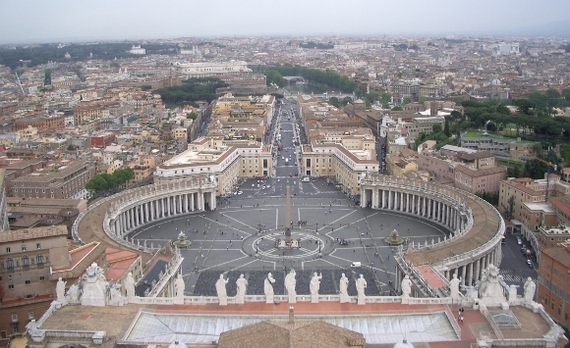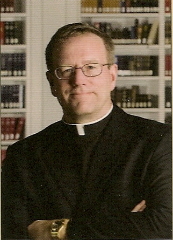We know what Pope Francis is saying: "You must try to seek God in every human life." And, of believing gays, "Who am I to judge them?"
But what does Pope Francis think, really? What is his theology and what is his vision for the Catholic church?
Perhaps there is a clue in one of the pontif''s most recent appointments -- the naming of the Rev. Robert Barron to auxiliary bishop of the Archdiocese of Los Angeles. If Barron's writing reflects the pope's own thinking, then Francis's theology is both lucid -- and traditional.
The Central Truth
For Fr. Barron, the central truth of all Christianity is the Incarnation. It is the shocking notion that God, the Creator and Ground of the Universe, humbled itself to take on human form, to enter into and enhance creation.
The difference between Catholicism and the rest of Christianity, according to Barron, is that other denominations fail to take the Incarnation seriously enough. If one does
indeed accept Jesus as the human face of God, after all, the ramifications are huge and - quite literally - awesome.
In his book, "Catholicism: A Journey to the Heart of the Faith" (Image), Barron cites an often overlooked passage in Mark (10:32): "And they were on the road, going up to Jerusalem and Jesus was walking ahead of them; and they were amazed, and those who followed were afraid."
And why not? If that is indeed God Incarnate walking up the road ahead of you, fear and amazement would be the most fitting response. And that, according to Barron, is why Christianity in general, and Catholicism in particular asks for a commitment: Is Jesus divine? Or not?
And the Doctrine That Follows
Barron says yes, and from there his text marches boldly on to explain and assert the body of Catholic belief as centuries of church authorities have built and elaborated upon it -- beginning with the Incarnation and extending to the Resurrection, Pentecost, the Immaculate Conception of Mary, the apparitions at Lourdes, the communion of saints like Therese of Lisieux and Katharine Drexel, and the doctrines of heaven, hell and purgatory.
Barron also tackles - fearlessly - the Catholic church's age-old understanding of the real presence of Christ in the Eucharist, which Barron characterizes as "nothing other than a sacramental extension of the Incarnation across space and time, the manner in which Christ continues to abide, in an embodied way with his church."
Protestant and Orthodox Christians, of course, would assert that accepting the Incarnation does not necessarily lead to faith in an Immaculate Conception, in miracles at Lourdes or many of the other doctrines of the Catholic church -- including those prohibiting the use of birth control.
But Barron, to his credit, is a wonderfully lucid writer who, like his church, is not afraid to commit to a clear and powerful understanding of who Jesus was. Which maybe explains why the Catholic church continues to be such a powerful force in the lives of millions of Catholics around the world, and why all those Catholics, including their newest pope, are so darned Catholic.
c 2015 Text and Photos, Barbara Falconer Newhall. All rights reserved.
A version of this post appeared originally on BarbaraFalconerNewhall.com. Barbara is the author of "Wrestling with God: Stories of Doubt and Faith," from Patheos Press.
If you enjoyed this post, you might like "Author Don Lattin: Americans Are More Thoughtful About Religion Than We Think." Also, "The Hagia Sophia -- Church, Mosque or Battleground?"


